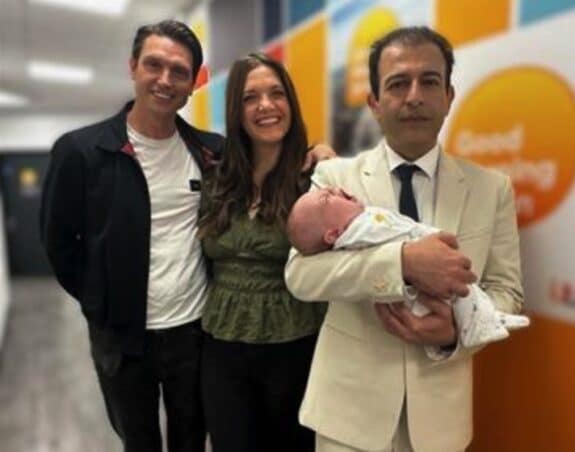When Lucy, a 32-year-old special needs teacher from a quiet village near Sonning Common, found out she was pregnant last summer, her world filled with joy. Like so many expectant parents, she and her partner Adam looked forward to those first milestones—tiny kicks, scan photos, choosing names. But what began as a hopeful new chapter quickly turned into a fight for her life and her baby’s.
At her 12-week scan, the sonographer’s voice—once light and reassuring—grew quiet. “She just went really silent,” Lucy recalls. “Adam and I were looking at each other thinking, ‘Something’s wrong.'” Then came the words no one expects during a routine ultrasound: there was a mass on Lucy’s ovary. She needed to see a specialist.
What doctors found was ovarian cancer—an aggressive diagnosis made all the more complicated by Lucy’s pregnancy. By 20 weeks, the cancer was progressing, and doctors at the John Radcliffe Hospital in Oxford were faced with an agonizing dilemma: delay surgery until after birth and risk the cancer spreading, or operate and attempt to save both lives—Lucy’s and her unborn baby’s.
The surgery that followed was anything but ordinary.
Over the course of a five-hour operation involving 15 specialists, surgeons delicately removed cancerous cells from both ovaries and the area behind Lucy’s womb. To access the tumors safely, they had to do something that’s been attempted only a handful of times across the globe: they gently lifted Lucy’s womb—still containing her baby—out of her abdomen.
While outside her body, the womb remained attached to vital arteries and reproductive organs to maintain blood flow and oxygen to the baby. Two doctors held it—carefully wrapped in a warm saline pack—the entire time, mimicking the womb’s natural environment.
“It was a complex and challenging surgery,” said Hooman Soleymani Majd, the consultant gynecological oncologist who led the team. “But the dedication and expertise of everyone involved ensured a safe outcome.”
Miraculously, both mother and baby came through. Lucy’s womb was returned to her body, and months later, at the end of January, her son Rafferty Isaac was born, healthy and weighing 6 pounds, 5 ounces.
Globally, ovarian cancer affects approximately 314,000 women every year, and about 207,000 women die from it annually, according to the Global Cancer Observatory. It is the 8th most common cancer and the 8th leading cause of cancer death among women worldwide. One of the greatest challenges is that it often goes undetected until it’s in an advanced stage. Lucy’s case was caught unusually early, purely by chance during a routine pregnancy scan.
Now, Lucy is preparing for what she calls her “completion surgery” to fully treat the cancer. But the hardest part is behind her, and her focus is right where she wants it: on the baby boy she once feared she might never meet.
“Ever since that 12-week scan,” she says, “we stopped saying, ‘when we meet our baby,’ and started saying, ‘if we meet our baby.’ Now that he’s here—safe and sound—that’s all that matters.”
Reflecting on the experience, Lucy said she never once doubted the team caring for her. “I felt in very safe hands,” she says. “Every doctor, every nurse—everyone was lovely, supportive, and gave us the reassurance we needed.”
She had no symptoms before her diagnosis, and she knows how lucky she was to catch it early. With so many women around the world never receiving that chance, Lucy’s story is not only a medical marvel—it’s a powerful reminder of how fragile and precious the road to motherhood can be.
“For me, the most important thing is that he’s here. That we made it.”
More Amazing Baby Stories:







